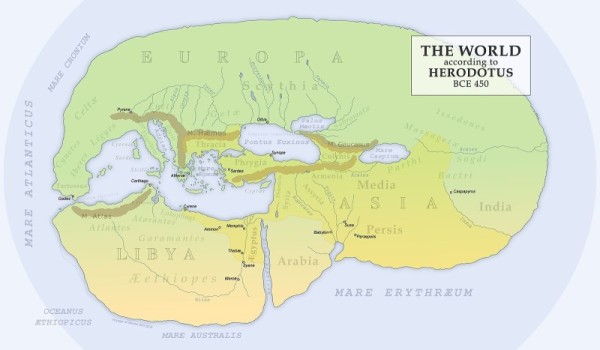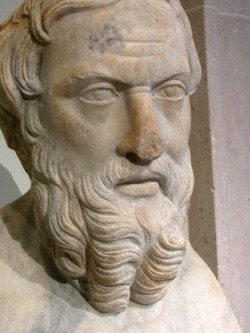These are the Libyan tribes whom we are able to name; and of these the greater number neither now pay any regard to the king of the Medes nor did they then.

Translated by George C. Macaulay — our special project presenting the complete Herodotus with URLs for all of those people, places, events, and things which baffles and discourages modern readers.
Previously on Herodotus
192. In the land of the nomads however there exist none of these, but other animals as follows: white-rump antelopes, gazelles, buffaloes, asses, not the horned kind but others which go without water (for in fact these never drink), oryes, whose horns are made into the sides of the Phoenician lyre (this animal is in size about equal to an ox), small foxes, hyenas, porcupines, wild rams, wolves, jackals, panthers, boryes, land-crocodiles about three cubits in length and very much resembling lizards, ostriches, and small snakes, each with one horn: these wild animals there are in this country, as well as those which exist elsewhere, except the stag and the wild-boar; but Libya has no stags nor wild boars at all. Also there are in this country three kinds of mice, one is called the two-legged mouse, another the zegeris (a name which is Libyan and signifies in the Hellenic tongue a hill), and a third the prickly mouse. There are also weasels produced in the silphion, which are very like those of Tartessos. Such are the wild animals which the land of the Libyans possesses, so far as we were able to discover by inquiries extended as much as possible.
193. Next to the Maxyan Libyans are the Zauekes, whose women drive their chariots for them to war.
194. Next to these are the Gyzantes, among whom honey is made in great quantity by bees, but in much greater quantity still it is said to be made by men, who work at it as a trade. However that may be, these all smear themselves over with red ochre and eat monkeys, which are produced in very great numbers upon their mountains.
195. Opposite these, as the Carthaginians say, there lies an island called Kyrauis, two hundred furlongs in length but narrow, to which one may walk over from the mainland; and it is full of olives and vines. In it they say there is a pool, from which the native girls with birds’ feathers smeared over with pitch bring up gold-dust out of the mud. Whether this is really so I do not know, but I write that which is reported; and nothing is impossible, for even in Zakynthos I saw myself pitch brought up out of a pool of water. There are there several pools, and the largest of them measures seventy feet each way and is two fathoms in depth. Into this they plunge a pole with a myrtle-branch bound to it, and then with the branch of the myrtle they bring up pitch, which has the smell of asphalt, but in other respects it is superior to the pitch of Pieria. This they pour into a pit dug near the pool; and when they have collected a large quantity, then they pour it into the jars from the pit: and whatever thing falls into the pool goes under ground and reappears in the sea, which is distant about four furlongs from the pool. Thus then the report about the island lying near the coast of Libya is also probably enough true.

CC BY-SA 2.0 image from Wikipedia.
196. The Carthaginians say also this, namely that there is a place in Libya and men dwelling there, outside the Pillars of Heracles, to whom when they have come and have taken the merchandise forth from their ships, they set it in order along the beach and embark again in their ships, and after that they raise a smoke; and the natives of the country seeing the smoke come to the sea, and then they lay down gold as an equivalent for the merchandise and retire to a distance away from the merchandise. The Carthaginians upon that disembark and examine it, and if the gold is in their opinion sufficient for the value of the merchandise, they take it up and go their way; but if not, they embark again in their ships and sit there; and the others approach and straightway add more gold to the former, until they satisfy them: and they say that neither party wrongs the other; for neither do the Carthaginians lay hands on the gold until it is made equal to the value of their merchandise, nor do the others lay hands on the merchandise until the Carthaginians have taken the gold.
197. These are the Libyan tribes whom we are able to name; and of these the greater number neither now pay any regard to the king of the Medes nor did they then. Thus much also I have to say about this land, namely that it is occupied by four races and no more, so far as we know; and of these races two are natives of the soil and the other two not so; for the Libyans and the Ethiopians are natives, the one race dwelling in the Northern parts of Libya and the other in the Southern, while the Phoenicians and the Hellenes are strangers.
198. I think moreover that (besides other things) in goodness of soil Libya does not very greatly excel as compared with Asia or Europe, except only the region of Kinyps, for the same name is given to the land as to the river. This region is equal to the best of lands in bringing forth the fruit of Demeter, nor does it at all resemble the rest of Libya; for it has black soil and is watered by springs, and neither has it fear of drought nor is it hurt by drinking too abundantly of rain; for rain there is in this part of Libya. Of the produce of the crops the same measures hold good here as for the Babylonian land. And that is good land also which the Euesperites occupy, for when it bears best it produces a hundred-fold, but the land in the region of Kinyps produces sometimes as much as three-hundred-fold.
– Herodotus, Book IV
| <—Previous | Master List | Next—> |
Herodotus made his living by being interesting. In a world where most people did not read and could not afford to buy a book even if they could, they would pay to listen to Herodotus recite from his books. They would not pay to be bored. In that world, the names that populate his stories would have some general familiarity to his audience. Their obscurity to us is a barrier that this series seeks to break down.
MORE INFORMATION
MAP LIBRARY
Because of lack of detail in maps as embedded images, we are providing links instead, enabling readers to view them full screen.

Leave a Reply
You must be logged in to post a comment.